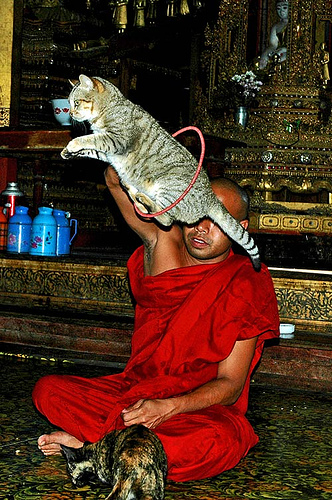From the Land of Green Ghosts is an autobiography. Pascal Khoo Thwe is from the Padaung ethnic minority in Burma — best known for the brass neck-rings worn by the women which elongate their necks — and was brought up with both the local animist traditions and Catholicism; the two religious traditions seem to have coexisted rather more easily than a strict reading of Catholic theology might allow.

He went to a Catholic seminary but later decided he didn’t want to be a priest, and instead went to university in Mandalay, where he studied for a couple of years before witnessing some of the political uprising of of 1988 and the government’s brutal response. He was briefly a political activist before it became clear that the revolution had failed, when he was forced to flee across country, initially to the area held by the longstanding ethnic Karenni rebellion and then across the border to Thailand. Eventually, thanks to an earlier chance meeting with a Cambridge professor visiting Mandalay, he was offered the chance to go to England to study literature at Cambridge.
The early parts, about a childhood in the backwoods of Burma with traditional customs and a Catholic education, are interesting and atmospheric; but it really comes into its own with the uprising. He was a relatively unpolitical youth confronted by staggering government violence, and he communicates something of the shock and the anger.
I’ve read quite a lot of books about dictatorships and government repression and civil war and so on as part of the Read The World challenge — mainly I think because it’s a subject that appeals to English language publishers — but this is one of the better ones. Above all because Khoo Thwe is a good writer. But what I particularly like is that it’s the opposite of self-aggrandising. He’s clearly a fairly impressive individual; at various times his actions show intelligence, courage and resourcefulness. But he constantly undercuts any hint that he’s the hero, even of his own story; he presents himself as naive, uncertain, and always at the mercy of events.
I’m not suggesting this is mock humility; I’m sure he genuinely felt those things. And after all, it’s basically a story of failed revolution and exile, although that’s hardly his fault. But another writer might have been less willing to be so frank, and the story would have been less interesting as a result.
From the Land of Green Ghosts is my book from Myanmar/Burma for the Read The World challenge.
» The photo is from Burma but admittedly only tangentially relevant. Lion Taming For Beginners 101 is © Taro Taylor and used under a CC by-nc licence.
